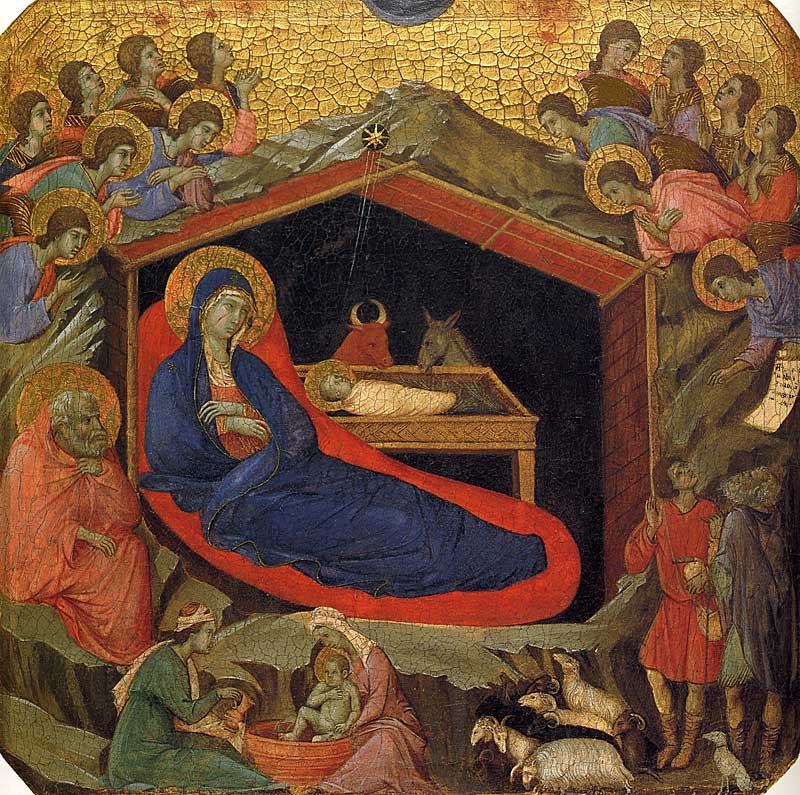Message of Abbot Paul - Sunday 25th December 2022
Abbot Paul • December 25, 2022

“Do not be afraid. Behold, I bring you news of great joy, a joy to be shared by the whole people.” So began the angels their message to the shepherds that first Christmas night, a message of great joy, a joy to be shared with all people. We are here tonight to hear that message once more and again it fills us with great joy. The birth of Jesus, the Messiah, takes our fears away, fills us with hope and gives us reason to rejoice. Even so, for many throughout the world this Christmas, it must be difficult to rejoice and well-nigh impossible to hope.
Tonight, our thoughts and prayers go out to the many families in this country, whose Christmas is marked by poverty and want. Please continue to donate food and money to your local food bank. Abroad it’s ten months since the war in Ukraine began, bringing destruction, death and the displacement of millions of refugees, a war where aggression shows no sign of abating. Sadly, this war on our doorstep has distracted us from warfare and extreme injustice in other parts of the world, in Somalia, Iran and Afghanistan, for example. Let us not forget the present hardships in North America caused by extreme conditions of ice and snow or the severe flooding earlier this year in Pakistan, to mention just two cases of natural disaster.
There can be no reason or excuse for the suffering inflicted on the weak and vulnerable by the great and powerful, or simply by those who are made powerful by the possession of a gun or a bomb. We know that there are no easy solutions to conflict, but the suffering, especially of women and children, is a crime that cries to heaven for vengeance. Can there be hope or joy for those who are hungry and naked, without home and family, for the innocent who see violence and death face to face? Nor should we ignore the murder of countless millions of human foetuses that takes place each year. The birth of the Son of God in a stable at Bethlehem and laid to sleep in swaddling bands in a manger, where cattle eat, is a sign of God’s solidarity with the poor and those who suffer, above all a sign of his love for children and for all those who are young and innocent.
Jesus Christ wasn’t born in a palace or a temple; he didn’t come into this world in a rich home or a luxury hotel. No, his companions were animals: the ox and the ass, sheep, mice and fleas. His mother Mary was a young village girl from the north, a peasant, and the man people presumed to be his father, Joseph, a simple carpenter. Both of them were surprised and confused at the strange events surrounding his conception and birth and now here he was, cradled in a manger, the baby to whom they were to give the name Jesus, meaning Saviour.
No sooner was he born, than angels appeared to shepherds in the fields, watching over their flocks by night, to tell them of his birth. “Today, in the city of David, a Saviour has been born to you: he is Christ the Lord.” And with the angels there appears a great throng of the heavenly host, praising God and singing, “Glory to God in the highest, and peace to men who enjoy his favour.” That new-born babe in the manger is God, the God who made all that is, and he comes to share our weakness and fragility, our suffering and pain. He is the Messiah, the Christ, the Saviour, and yet his way of saving is not Man’s but God’s. It is not through pride and self-seeking that he will save us but through humility and self-emptying, bringing life through death and redemption through suffering. This child in the manger is born to die and, through his death, he will reconcile the whole of creation with God. And in Christ, all suffering is redemptive, all pain has purpose and meaning, and even little children can share in God’s work of salvation because God now shares fully in their suffering and pain.
May the joy of Christmas be yours and may the child lying in the manger help us all to understand and value the suffering and death of innocent young children today. Christ’s birth doesn’t mean that their suffering is fine, that it doesn’t matter and we needn’t worry about it. Quite the opposite: it is wrong, it is unjust, it should not happen, it must be eradicated, but while that suffering and pain last, we know that Christ is still being born today and in still lying there, crying in the manger. May his suffering, death and resurrection bring to all people hope, life and salvation.
On behalf of Fr Prior and the Monastic Community I wish you all a very joyful and holy Christmas. It’s particularly good at Christmas to see so many new faces and visitors with us. This is your home, your church. Come back whenever you want. There will always be a warm welcome awaiting you. “Do not be afraid. Behold, I bring you news of great joy, a joy to be shared by the whole people.”









